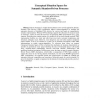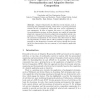211 search results - page 3 / 43 » Description and Composition of E-Learning Services |
ESWS
2008
Springer
13 years 8 months ago
2008
Springer
Context-awareness is a highly desired feature across several application domains. Semantic Web Services (SWS) technologies address context-adaptation by enabling the automatic disc...
AH
2006
Springer
13 years 10 months ago
2006
Springer
Adaptive Hypermedia is utilised in several domains, such as eLearning and professional training, where there is a growing movement towards the use of cognitively richer and more `a...
SEMWEB
2004
Springer
13 years 11 months ago
2004
Springer
Web services are in the midst of making the transition from being a promising technology to being widely used in the industry. However, most efforts to use Web services have been m...
WSC
2007
13 years 8 months ago
2007
Two basic approaches to simulation model composition can be distinguished, depending on whether the unit of composition is a model specification according to a certain modeling f...
JSW
2007
13 years 6 months ago
2007
— In this paper, we present our approach to describe and compose services for distant learning and research activities. For this purpose, we propose a metadata model for indexing...


